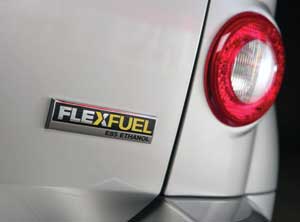Automakers work to expand ethanol use

September 8, 2008
BY Kris Bevill
General Motors Corp., the largest automaker in the world, posted a $15.5 billion loss for the second quarter of 2008, the third-worst quarterly performance in the company's history. Despite the losses, Candace Wheeler, a technical fellow at GM who has focused on sustainable transportation for the past 12 years, said the company is committed to its "advanced technology strategy," which includes flexible-fuel vehicle manufacturing and the promotion of alternative fuels such as E85.
In July, the company formed an alliance with the National Governors Association to expand E85 infrastructure and availability throughout eight unspecified states within the next year. "The infrastructure development for E85 needs to expand now if the nation is to be ready for the significant growth in ethanol coming from new sources," said Beth Lowry, GM vice president of environment, energy and safety policy. GM will contribute to the expansion project by connecting fuel retailers with available grants for infrastructure installations and conversions, as well as offer its assistance in determining the best location for E85 pumps. The company has expertise in expanding E85 availability. According to GM, the company has helped to bring 300 E85 pumps on line over the past three years.
GM also recently hosted a one-day "biofuels backgrounder" for media representatives to promote biomass-based biofuels, which the company sees as one step in the ladder to reaching energy independence. The biofuels session included presentations from plant genomics firm Ceres Inc., Mascoma Corp. and BlueFire Ethanol, as well as GM. Wheeler told attendees that GM's strategy involves a gradual progression in fuel usage from petroleum to biofuels, electricity and ultimately hydrogen. The company's current view is that biofuels—specifically ethanol—remain the best near-term energy alternative to oil.
GM plans to increase the number of flexible-fuel vehicle (FFV) models it produces to 18 in 2009 and said that half of its total production will be FFVs by 2012, provided that the infrastructure is in place to support it.
Ford Motor Co. has also worked to expand E85 infrastructure in recent years. The company has a long-standing relationship with VeraSun Energy Corp., one of the largest ethanol producers in the world. In 2006, Ford and VeraSun partnered to open the Midwest E85 Corridor, allowing travelers to drive between Kansas City, Mo., and Chicago along Interstate 55 and Interstate 70, fueling exclusively with E85. Ford currently offers seven FFV models and plans to add more in 2009.
In July, the company formed an alliance with the National Governors Association to expand E85 infrastructure and availability throughout eight unspecified states within the next year. "The infrastructure development for E85 needs to expand now if the nation is to be ready for the significant growth in ethanol coming from new sources," said Beth Lowry, GM vice president of environment, energy and safety policy. GM will contribute to the expansion project by connecting fuel retailers with available grants for infrastructure installations and conversions, as well as offer its assistance in determining the best location for E85 pumps. The company has expertise in expanding E85 availability. According to GM, the company has helped to bring 300 E85 pumps on line over the past three years.
GM also recently hosted a one-day "biofuels backgrounder" for media representatives to promote biomass-based biofuels, which the company sees as one step in the ladder to reaching energy independence. The biofuels session included presentations from plant genomics firm Ceres Inc., Mascoma Corp. and BlueFire Ethanol, as well as GM. Wheeler told attendees that GM's strategy involves a gradual progression in fuel usage from petroleum to biofuels, electricity and ultimately hydrogen. The company's current view is that biofuels—specifically ethanol—remain the best near-term energy alternative to oil.
GM plans to increase the number of flexible-fuel vehicle (FFV) models it produces to 18 in 2009 and said that half of its total production will be FFVs by 2012, provided that the infrastructure is in place to support it.
Ford Motor Co. has also worked to expand E85 infrastructure in recent years. The company has a long-standing relationship with VeraSun Energy Corp., one of the largest ethanol producers in the world. In 2006, Ford and VeraSun partnered to open the Midwest E85 Corridor, allowing travelers to drive between Kansas City, Mo., and Chicago along Interstate 55 and Interstate 70, fueling exclusively with E85. Ford currently offers seven FFV models and plans to add more in 2009.
Advertisement
Advertisement
Upcoming Events





